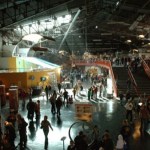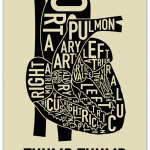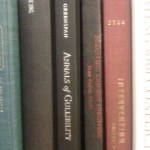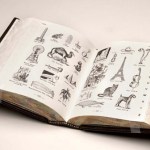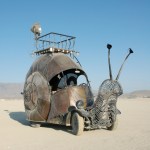Books & Essays
"the whole point of the Exploratorium is for people to feel they have the capacity to understand things." --Frank Oppenheimer
I admit it: I'd never heard of Frank Oppenheimer until I received my review copy of K.C. Cole's Something Incredibly Wonderful Happens: Frank Oppenheimer and the world he made up. I thought for a day or two that it was a book about Robert Oppenheimer, the so-called "Father of the Atomic Bomb," and was thus completely befuddled by the book's cheery title and its cover - a fanciful cloud of iridescent bubbles.
Of course, I was off by a sibling. Frank Oppenheimer was…
Many of the commenters on my earlier post about the so-called wisdom of crowds, "Science is not a democracy," have expressed distaste for the phrase "scientific consensus." I don't really share that distaste, and here's why.
To me, it's like being disturbed by the phrase "electoral college." You may detest the way our nation's electoral system works; you may not trust the outcomes it produces; but there is an established system, and the electoral college is part of it. You can object to the existence of the electoral college and criticize its characteristics, and you can try to change the…
"It is the largest thing we have ever built," says Whitesides, "and we have assembled it from transistors--the smallest things we know how to make. It is a chrysalis we are forming around the planet...a table where we sit to gossip, a suq where we buy and sell; a shadowy corner for planning mischief; a library holding the entire world's information; a friend, a game, a matchmaker, a psychiatrist, an erotic dream, a babysitter, a teacher, a spy....The best and worst and most ordinary of us reflected--and perhaps distorted--in a silvery fog of bits."
--George Whitesides describing the Internet…
Found on ebay: "Peter Parley's Tales of Animals, containing descriptions of three hundred quadrupeds, birds, fishes, reptiles, and insects. With numerous engravings."
Note to the Critics.
This book is almost wholly a mere compilation; free use has been made, in preparing it, of the Library of Entertaining Knowledge, the Family Library, Wilson's Ornithology, Gedman's Natural History of North America, &c. I make this confession to you; but if I chose to keep this matter a secret from my readers generally, and leave them to infer that my various knowledge is original, this is either their…
The National Library of Medicine's "Turning the Pages" gallery lets you turn the virtual pages of classic science/medicine manuscripts. Check out Hieronymus Brunschwig's Liber de Arte Distillandi de Compositis (1512):
Note that the NLM's copy is hand-colored; uncolored copies also exist, such as this copy at ECHO. Comparison with the images of the ECHO copy show that NLM has elided the boring, text-only pages from their animation.
I'm not usually a big fan of animations that try to replicate the tactile experience of books, but given that you aren't usually allowed to touch manuscripts of…
Oooh, look! "Science Czar" John Holdren has recommended Chris & Sheril's Unscientific America in Foreign Policy Magazine's Global Thinkers Book Club.
It's so nice to see the two topics most likely to draw hecklers to my blog, brought together at last! Maybe all the angry right-wingers and New Atheists will cancel each other out. . . ? Nah, Santa's not that good to me. Sigh.
Thylacine Dingo Comparison
Carl Buell
In Slate, Matt Gaffney explains how the constraints of a given system - in this case crossword puzzles - may lead to suspiciously similar yet independent solutions. Gaffney wrote a Poe-themed crossword with the elements BRAVE NEW WORLD, INTRAVENOUS DRIP, CONTRAVENE, COBRA VENOM, and VENTNOR AVENUE (all of which have "raven" embedded in them). He was very proud of his puzzle, but. . .
I soon learned that I wasn't as clever as I thought. Over the next couple of days, I started getting e-mails from solvers telling me that my theme had been done before. In…
I really wanted to go to the D is for Digitize conference in New York. I couldn't go, but Harry Lewis did, and according to him, the star was Daniel Reetz of DIYBookScanner.org:
While everyone else at the conference was ruminating about whether Google had a library monopoly or whether Amazon or Microsoft might imaginably be able to compete, along comes this dude with his Rube Goldberg contraption and says, hey, let's all just start doing it, and we'll catch up eventually. (source)
Reetz made the book scanner above from "trash and cheap cameras." Very impressive. But what does it mean for…
A few of my favorite holiday shopping suggestions from the past year of blogging. . .
#1. Pandemic, the Board Game. Turn H1N1 into holiday fun for everyone! (Already have Pandemic? Z-Man games has an upgrade pack.)
#2. Blue Barnhouse letterpress. Yeah, they're artistic and individually pressed, but these are not your parents' greeting cards. In addition to their Happy Colonoscopy cards, they have many more offensive yet hilarious greetings - these invites were perfect for a certain unexpurgated physiologist of my acquaintance. . .
#3. Like some paper with your science? Ork posters' heart…
fog 10
Steven Hight
In the growling gray light (San Francisco still has foghorns), I collect the San Francisco Chronicle from the wet steps. I am so lonely I must subscribe to three papers - the Wall Street Journal, the New York Times, the San Francisco Chronicle. I remark their thinness as I climb the stairs. The three together equal what I remember.
The November Harper's has a meandering, tragic paean to the lost city newspaper by Richard Rodriguez (quoted above). Unfortunately the full article is subscriber-only, but Marcus Banks links to two articles on the possible future of the…
If I weren't so darn busy, I'd be tempted to read this book:
As you can tell from the photo, I've been spending a lot of time in the library. Sorry for the low post volume - I have quite a bit to write about the Harvard Lab opening and other things, and hope to get back on the blog in a few days. Have a great weekend!
From an essay by AS Byatt:
As I grow older, the fact of the existence of the world's huge compendium of changing and unchangeable tales seems to me more, not less, mysterious. How can they so steadily resemble each other, wherever they come from? How can they be so abstract and so concrete?
Just got in from a really interesting talk by Viktor Mayer-Schonberger, author of Delete: The Virtue of Forgetting in the Digital Age. Mayer-Schonberger's concern is that with a shift to digital modes of storage, we've transitioned from a biologically hardwired default of forgetting information, to a default of remembering. It's literally gotten harder to erase certain types of information than it has to retrieve it. Many types of ephemera just aren't ephemeral anymore.
Why is this a problem? In addition to swamping us with unwanted, outdated information we'd all rather forget (high school…
Every time I move to a new home, I try really hard to get rid of all my extra stuff - or at least to put it in storage. But when it comes to books, I have no willpower. Regarding my ten-pound, 6-inch-wide, half-unbound early-twentieth century Funk & Wagnall's dictionary, there wasn't even a question: it goes with me where I go!
Do I use the thing to look up words? Rarely (although it's quite cool to see the early definitions of now-common scientific terms - they're often a little bit different than we might expect). Mostly, I love the pictures. Old dictionaries were works of art, with…
For the bibliophile who can't bear to leave all his or her books at home: a one-of-a-kind necklace of eleven miniature leather-bound books by TheBlackSpotBooks. Via NotCot.
An enigmatic photo from Morbid Anatomy's review of the Quay Brothers show at Parsons in NYC. Read all about it here.
Those of you who visited Abebooks' weird book room have had an impact - check out this story in the Guardian.
Also, I was thrilled to see photos of the Snail Art Car, the "Golden Mean," at Burning Man this week - here's why. Glad to have contributed even a tiny bit of inspiration to what turned out to be a whimsical steampunk triumph for Kyrsten, Jon and their team.
Damn, I really want to go to Burning Man. . .
"It will die, eventually, because no one will know how to do it." But for now, a few miles from here, Firefly Press' John Kristensen is keeping the tradition of letterpress alive, as seen in this beautiful video by Chuck Kraemer.
Via NOTCOT.
The Haunted Vagina is just one of the titles featured in Abebooks' Weird Book Room, where you can find such treasures as Bombproof Your Horse, Is Your Dog Gay, The Thermodynamics of Pizza, Do-it-Yourself Coffins for Pets and People, and People Who Don't Know They're Dead.
The funniest thing about many of these books may be the title - my mom owned a copy of The Great Pantyhose Crafts Book, and it was actually kind of useful. Anyway, you can find reviews of many of these books on both Abebooks and Amazon. It turns out a lot of people have actually tried the instructions in Do-It-Yourself…
I read Scibling Jonah Lehrer's How We Decide some time ago, but Moveable Type ate my half-finished review, and it's taken me until now to get back to it. You may have seen quite a few reviews elsewhere by now - Adam Kepecs reviewed it for Nature back in April, and to make a long story short, I largely agree with him: Lehrer is a very good writer, but this is not a great book.
Lehrer starts his book with an airplane anecdote, so I'll do the same - although his opening anecdote is about crashing a plane (albeit a simulated plane), so I'm not sure I'd recommend the book for nervous flyers.…
